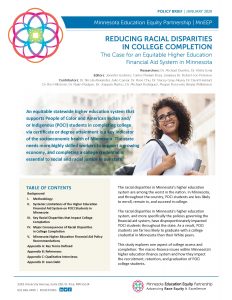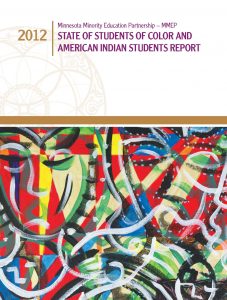Research

Reducing Racial Disparities in College Competition
Policy Brief | January 2020
2020 MnEEP College Completion Policy Brief
The Case for an Equitable Higher Education
Financial Aid System in Minnesota
Researchers: Dr. Michael Dueñes, Dr. Krista Soria
Editors: Jennifer Godinez, Carlos Mariani Rosa, Leiataua Dr. Robert Jon Peterson
Contributors: Dr. Nicola Alexander, Julio Caesar, Dr. Rose Chu, Dr. Stacey Gray-Akyea, Dr. David Heistad, Dr. Rev Hillstrom, Dr. Naim Madyun, Dr. Joaquin Muñoz, Dr. Michael Rodriguez, Megan Rozowski, Briana Williamson
Abstract
The racial disparities in Minnesota’s higher education system are among the worst in the nation. In Minnesota, and throughout the country, POCI students are less likely to enroll, remain in, and succeed in college.
The racial disparities in Minnesota’s higher education system, and more specifically the policies governing the financial aid system, have disproportionately impacted POCI students throughout the state. As a result, POCI students are far less likely to graduate with a college credential in Minnesota than their White peers.
This study explores one aspect of college access and completion: The macro-finance issues within Minnesota’s higher education finance system and how they impact the recruitment, retention, and graduation of POCI college students.
Download the complete Policy Brief
State of Students of Color and American Indian Students Report
2012 Minnesota Minority Education Partnership

Overview
Our Report demonstrated the power of telling a whole story – not just a high school graduation or early childhood education access story. With very limited resources, we kept capturing the data and telling this story throughout the decade. It is a testament to Minnesota’s earnestness that it listened and began to move policy and practice in response. Many others are now telling the story. New data analysis tools that drive instruction and management have been developed and used by schools and colleges to better shed light on how students do as they move along the education pathway and even how they do from day-to-day.
We are proud to continue our truth-telling with this Report. We find both much to be disappointed in and to be hopeful about in the data collected here and in the ways Minnesota’s educators are responding. We hope you can use the information gathered here to support your efforts to create a new Minnesota, one where access to a rigorous high quality educational program is a promise we make to every single young person in our state, one where we are wise enough to meet the needs of each student as opposed to using a “one size fits all” approach, and one that challenges the systemic structure of our schools and colleges to redesign in a way that maximizes the racial/cultural diversity and potential of our student bodies.
Download the complete report
Solutions In Action Stakeholder Input Listening Sessions, Focus Groups, Stakeholder Surveys
Listening Sessions, Focus Groups, Stakeholder Surveys
Prepared by Saint Paul Public School, Department of Equity, Department of Research, Evaluation and Assessment
July 9, 2014
Introduction
As part of a district initiative to reduce the disproportionate patterns in suspensions among SPPS schools, staff in the Equity department designed and implemented a research process designed to collect feedback from a community and school partners regarding their experiences and opinions. This report presents the results of the internal inquiry.
Methodology
The SIA Stakeholder Survey was designed to collect opinions regarding Saint Paul Public School’s desire to eliminate the racial predictability of suspensions of our African American/Black students, and to ensure that our African American/Black students receive a premier education. Questions were developed by the SIA steering committee members. All surveys had common questions and several surveys had individual questions nuanced toward collecting specific feedback.
Solutions In Action (SIA) Listening Sessions
The SIA listening sessions were designed to gain understanding around the issue of suspensions from the community and to provide insight on SPPS organization. Questions were developed in the SIA steering committee and refined later by staff in the departments of Equity and Research, Evaluation and Assessment.
Download the complete report
Educational Settings Impact on Minnesota’s American Indian Academic Proficiency
Published by LAP LAMBERT Academic Publishing OmniScriptum GmbH & Co. KG Heinrich-Böcking-Str. 6-8, 66121, Saarbrücken, Germany.
Abstract The Minnesota Department of Education has collected Minnesota Comprehensive Assessment (MCA) results on all students tested. Communities, districts and schools have used this to assess how students performed. Prior to this study there had been no known research on the impact of educational setting (Urban, Metro, Out State, and Bureau of Indian Education [BIE] schools) on mathematical and reading proficiency for Minnesota’s American Indian students. This study incorporated multiple variables, which used empirical data from four educational settings and two subjects. The analysis used three regression models, which provide information on the relationship between educational setting and proficiency. Based upon the findings, several realities appear to be present regardless of international regulations, federal policies and state laws. One concern is whether these laws and regulations create a political facade, which masks the educational policies of the U.S government. The lack of proficiency brings into question if instructional strategies, culturally relevant pedagogy and culturally appropriate assessment are in place for Minnesota’s American Indian students.
The Minnesota Department of Education has collected Minnesota Comprehensive Assessment (MCA) results on all students tested. Communities, districts and schools have used this to assess how students performed. Prior to this study there had been no known research on the impact of educational setting (Urban, Metro, Out State, and Bureau of Indian Education [BIE] schools) on mathematical and reading proficiency for Minnesota’s American Indian students. This study incorporated multiple variables, which used empirical data from four educational settings and two subjects. The analysis used three regression models, which provide information on the relationship between educational setting and proficiency. Based upon the findings, several realities appear to be present regardless of international regulations, federal policies and state laws. One concern is whether these laws and regulations create a political facade, which masks the educational policies of the U.S government. The lack of proficiency brings into question if instructional strategies, culturally relevant pedagogy and culturally appropriate assessment are in place for Minnesota’s American Indian students.
Book available online
A Study of the Impact Educational Setting has on Academic Proficiency of American Indian Students as Measured by the Minnesota Comprehensive Assessment
A published dissertation completed for the requirements for the degree of Ed.D. University of Minnesota. Hillstrom, R. (2013).
Abstract
The Minnesota Department of Education has collected Minnesota Comprehensive Assessments (MCA) results on every American Indian student who has taken the tests. This information has been made available so communities and parents can assess how their districts, schools, and students are performing based upon MCA proficiency criteria. Prior to this study, there had been no known studies on the impact of educational setting (Urban-Minneapolis/St. Paul, Metro-seven-county Metro area, Out State-greater Minnesota, and Bureau of Indian Education [BIE] schools) on mathematic and/or reading proficiency as measured by the MCAs for American Indian students in the state of Minnesota. The research population for this study included all American Indian students in the state of Minnesota, grades 3-11, who participated in MCAs between 2007-2010. This study incorporated multiple variables, which used empirical data from four educational settings (Urban, Metro, Out State, and BIE) and two academic subjects (mathematics and reading). The analysis used three regression models (linear, non-linear, and logistic), which provided statistical information regarding the relationship between educational setting and proficiency as measured by the MCAs. The results of this research supported the theory that educational setting does have an impact on MCA proficiency for the American Indian student in the state of Minnesota between 2007-2010.
Keywords: Assessment, Education, Minnesota, Native, Regression, Test
Download the complete document
Echoes of the Past, Voices of Today: A Case Study on the American Indian Drum in the Robbinsdale Area Schools American Indian Education Program
Unpublished thesis completed for the requirements for the degree of Master of Arts in Ethnomusicology, Bethel University, Saint Paul MN, Hillstrom, R. (2009).